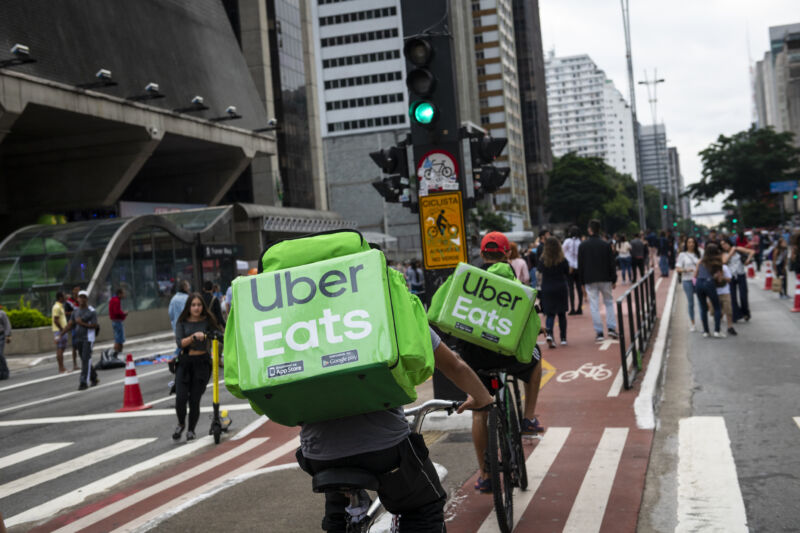
Uber is trying again to acquire a food delivery rival after it wiped out on its last attempt earlier this year. The company said today it plans chow down on Postmates in a deal valued at $2.6 billion.
The companies announced the all-stock transaction this morning. Uber said the companies' businesses are "highly complementary," as they have different customer bases in different parts of the country. Uber in its press release praised Postmates as "an early pioneer of 'delivery-as-a-service,'" a truly spectacular buzzword jam for our era.
What Uber probably wants, though, is for someone to deliver it a profit. The company lost $2.9 billion in the first quarter of this year (period ending March 31), after losing $1.1 billion each in Q4 and Q3 and a whopping $5 billion in the quarter before that.
The COVID-19 pandemic crashed the ride-hailing half of Uber's business. Demand for rides dropped by 70 percent in recent months, as people stopped going anywhere for several months and have remained understandably leery of sharing an enclosed space with one or more strangers on the rare occasion they do. Uber laid off 6,700 workers—about a quarter of its global full-time workforce—across two rounds of job cuts in May.
Food delivery businesses, on the other hand, have seen increased demand as all the people who can't go anywhere to get anything instead use apps and services to have all those things, including restaurant meals, brought to them. Bookings on Uber Eats more than doubled in Q2 2020 as compared to 2019, Uber CEO Dara Khosrowshahi said in a written statement.
Trust and antitrust
Uber tried to acquire rival GrubHub in May. The companies were able to agree on a transaction price, sources told Bloomberg, but negotiations were stuck on one specific point: the breakup fee.
Many merger agreements contain language requiring one company to pay a penalty to the other if for some reason the deal cannot come to fruition. In cases that are likely to receive a great deal of scrutiny from regulators, the company being acquired may request the company doing the buying to compensate them if the deal gets nixed by the government. That fee is reportedly what GrubHub and Uber were stuck on, and with good reason: the mere rumor that Uber and GrubHub might merge already had state and federal regulators deeply concerned.
GrubHub ultimately went a different direction entirely, instead agreeing in June to a sale to Amsterdam-based Just Eat Takeaway in an all-stock deal valued at $7.3 billion.
Uber's Postmates plan may face an easier path to approval than its GrubHub aspirations did, but regulators are still likely to scrutinize the deal closely. About 95 percent of the US restaurant food delivery market is controlled by four businesses: GrubHub (which includes Seamless), DoorDash, Postmates, and Uber Eats.
https://news.google.com/__i/rss/rd/articles/CBMifGh0dHBzOi8vYXJzdGVjaG5pY2EuY29tL2luZm9ybWF0aW9uLXRlY2hub2xvZ3kvMjAyMC8wNy91YmVyLXBsYW5zLXRvLWdvYmJsZS11cC1kZWxpdmVyeS1yaXZhbC1wb3N0bWF0ZXMtaW4tMi02LWJpbGxpb24tZGVhbC_SAYIBaHR0cHM6Ly9hcnN0ZWNobmljYS5jb20vaW5mb3JtYXRpb24tdGVjaG5vbG9neS8yMDIwLzA3L3ViZXItcGxhbnMtdG8tZ29iYmxlLXVwLWRlbGl2ZXJ5LXJpdmFsLXBvc3RtYXRlcy1pbi0yLTYtYmlsbGlvbi1kZWFsLz9hbXA9MQ?oc=5
2020-07-06 16:15:00Z
52780900847686
Tidak ada komentar:
Posting Komentar